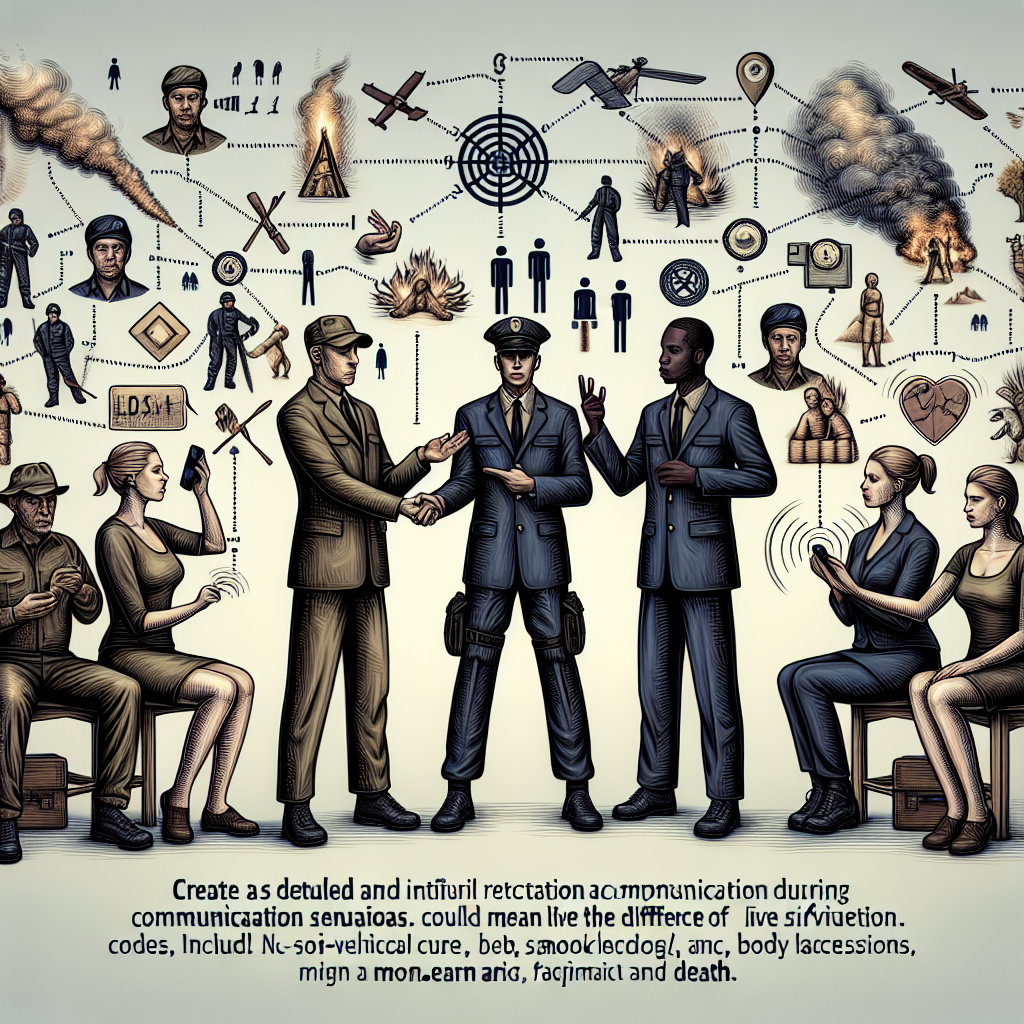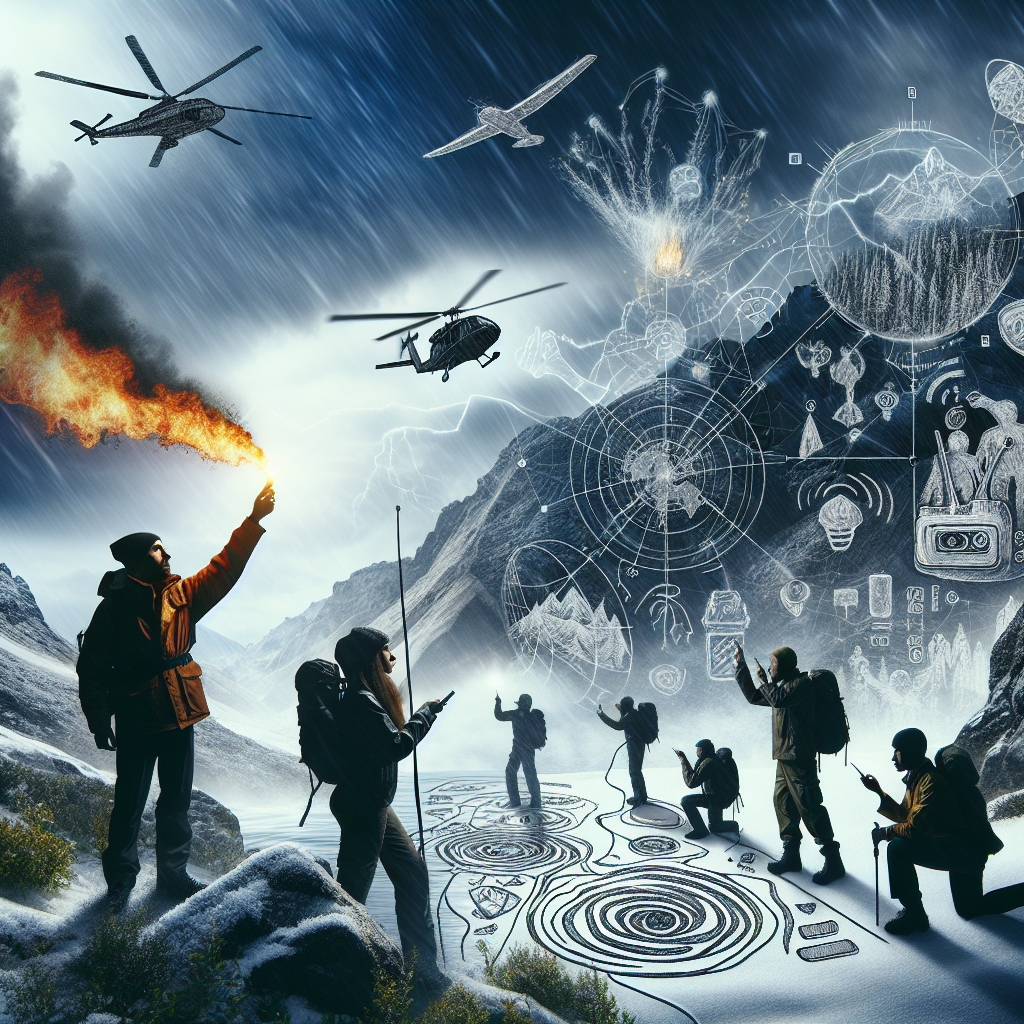In times of survival, communication becomes an essential tool for not only staying connected but also ensuring the safety and well-being of yourself and others. Whether you find yourself stranded in the wilderness or in a post-disaster situation, the ability to effectively communicate can make all the difference. From mastering non-verbal cues to honing your active listening skills, this article explores the vital communication skills that can help you navigate through the challenges of a survival scenario. So, let’s discover how these skills can be the key to your success and survival.
Overview of communication in survival situations
Communication plays a crucial role in survival scenarios, as it acts as the lifeline that connects individuals and allows for effective coordination and cooperation. In a survival situation, communication serves as a means to obtain vital information, make informed decisions, and ensure the safety and well-being of all individuals involved. Without proper communication, confusion and chaos can quickly ensue, hindering the chances of survival. Therefore, developing strong communication skills is essential for anyone facing a survival scenario.
How communication can mean the difference between life and death
In a survival scenario, clear and effective communication can literally mean the difference between life and death. For example, when assessing a dangerous situation or encountering a potential threat, being able to accurately and quickly convey information to others can help avoid hazards and ensure the safety of the group. Additionally, communication is crucial for coordinating rescue efforts, signaling for help, and providing crucial updates on the status of individuals and resources. Without efficient communication, survival becomes significantly more challenging and dangerous.

The role of effective communication in maintaining morale and teamwork
Effective communication not only helps in facilitating survival strategies and decision-making, but it also plays a vital role in maintaining morale and fostering teamwork within the group. In a high-stress and challenging environment, clear and supportive communication can boost morale, reduce anxiety, and create a sense of unity among survivors. By openly discussing concerns, sharing ideas, and actively listening to one another, the group can work together more effectively, adapting to changing circumstances and increasing their overall chances of survival.
Verbal Communication Skills
Clear and concise communication
In a survival scenario, clear and concise communication is necessary to ensure that messages are accurately and efficiently conveyed. It is important to use simple and easily understandable language, avoiding jargon or technical terms that may confuse others. By eliminating unnecessary details and getting straight to the point, you can convey vital information quickly, leaving little room for misinterpretation.
Active listening
Active listening is a crucial skill in any communication setting, but it becomes even more vital in survival scenarios. Listening attentively to others allows you to fully understand their concerns, ideas, or instructions, enabling effective collaboration and problem-solving. By acknowledging and responding appropriately to what others are saying, you show respect and foster trust within the group.
Using proper tone and volume
The tone and volume of your voice play a significant role in conveying your messages effectively. In a survival scenario, it is important to use a confident and assertive tone to command attention and ensure that your message is heard. However, it is equally important to avoid shouting or speaking too softly, as this can cause confusion or make it difficult for others to hear important information.
Effective questioning and gathering information
Asking the right questions and gathering accurate information are essential skills in a survival scenario. By asking open-ended and targeted questions, you can elicit valuable information from others and gather a comprehensive understanding of the situation at hand. This allows for informed decision-making and enables the group to strategize effectively towards survival.

Non-Verbal Communication Skills
Understanding and utilizing body language
While verbal communication is important, non-verbal communication through body language also plays a significant role in conveying messages and understanding others in a survival scenario. Understanding the body language of others can provide insights into their emotions, intentions, and level of comfort or discomfort. Likewise, being aware of your own body language and ensuring it aligns with your intended message can enhance communication and prevent misunderstandings.
Mastering facial expressions and eye contact
Facial expressions and eye contact are powerful non-verbal cues that can convey emotions, intentions, and sincerity. In a survival scenario, carefully controlling facial expressions and maintaining appropriate eye contact can help establish trust and convey credibility. By mirroring the expressions and maintaining eye contact, you can foster a sense of connection and understanding, further strengthening communication within the group.
Recognizing and interpreting non-verbal cues from others
Survival scenarios often involve high-stress situations where verbal communication may be difficult or even impossible. In such cases, being able to recognize and interpret non-verbal cues becomes paramount. Gestures, postures, and even subtle movements can convey important messages or warnings. By actively observing and interpreting the non-verbal cues of others, you can better assess the situation, predict potential threats, and respond accordingly.
Signaling and Visual Communication
Using visual signals during emergencies
Visual signals are invaluable in survival scenarios, especially in situations where distant or loud communication is impractical. Basic visual signals such as hand signals, mirroring, or pre-agreed gestures can be used to communicate messages, warnings, or requests for assistance. These signals can be easily understood by others, even from a distance, greatly enhancing the efficiency and effectiveness of information exchange.
Knowledge of internationally recognized distress signals
In emergency situations, it is essential to be aware of internationally recognized distress signals. These signals are widely understood and used by emergency responders or other individuals who may be able to provide assistance. Examples of distress signals include waving a flag upside down, making a “SOS” sign with your arms, or using a whistle in a specific pattern. By using these signals, you can attract attention and communicate your need for help, increasing the chances of being rescued.
Making use of reflective materials for visibility
Reflective materials, such as mirrors, can be invaluable tools for communication in survival scenarios. By reflecting sunlight or other light sources, you can create visible signals that can be seen from a distance. Mirrors can also be used to communicate messages by reflecting light in a specific direction. One simple technique is to use a mirror to signal Morse code, allowing for the transmission of more complex information. This type of visual communication can greatly increase the likelihood of being spotted by rescuers or passing aircraft.
Writing and Note-Taking Skills
Importance of written communication in information exchange
Written communication is essential for sharing detailed information, especially in situations where verbal communication may be challenging or impractical. In a survival scenario, being able to write legibly and concisely can facilitate the exchange of crucial information, such as coordinates, medical conditions, or resource inventories. Additionally, written messages can serve as a permanent record, ensuring that important details are not forgotten or misunderstood.
Developing quick and legible written messages
In survival scenarios, time is often of the essence, and being able to quickly write down messages becomes crucial. Developing the skill to write quickly, yet legibly, allows for the efficient transmission of information, leaving no room for confusion or misinterpretation. Practicing writing under time pressure and in various conditions can greatly improve your ability to write clear and concise messages when it matters most.
Using universally understood symbols in written communication
To enhance the effectiveness of written communication, it is beneficial to use universally understood symbols and icons. Symbols such as arrows, crosses, or exclamation marks can convey meanings quickly and without the need for extensive explanations. Additionally, using internationally recognized symbols, such as those found in survival manuals or maps, can facilitate communication with individuals from diverse cultural backgrounds.
Technology and Communication Devices
Understanding and utilizing various communication devices
In modern survival scenarios, various communication devices can greatly assist in information exchange and coordination. Understanding how to operate and effectively use devices such as radios, satellite phones, or GPS devices can significantly enhance communication capabilities. Being familiar with the features and limitations of these devices allows for quick and accurate communication, ensuring that valuable resources are not wasted during critical situations.
Maximizing the effectiveness of radios and walkie-talkies
Radios and walkie-talkies are commonly used communication devices in survival scenarios. To maximize their effectiveness, it is important to follow proper radio etiquette and protocols. This includes using clear and concise language, giving accurate and relevant information, and verifying message receipt. Additionally, maintaining and conserving battery life becomes crucial, as these devices may be the primary means of communication for an extended period.
Alternative communication methods when technology fails
While technology can greatly aid communication in survival scenarios, it is also essential to have alternative methods in place when technology fails. This can include using signal mirrors, whistles, or even creating improvised communication devices. Being knowledgeable and prepared with alternative communication methods ensures that communication remains possible even in the absence of technology, increasing the chances of survival.
Interpersonal Skills
Building trust and rapport with fellow survivors
Interpersonal skills are vital in maintaining a positive and cohesive group dynamic in survival scenarios. Building trust and rapport with fellow survivors helps foster a supportive environment where effective communication can thrive. By being reliable, honest, and empathetic, you can inspire trust and encourage open communication within the group, leading to better problem-solving and decision-making.
Resolving conflicts and maintaining a positive environment
Conflicts are bound to arise in survival scenarios, often due to stress, exhaustion, or differences in opinion. Being able to resolve conflicts effectively and maintain a positive environment is crucial for the overall well-being and cohesion of the group. Active listening, empathy, and compromise are essential skills when navigating disagreements, ensuring that communication remains constructive and solutions are reached without causing further tensions.
Empathy and emotional intelligence in group dynamics
Survival scenarios can be emotionally challenging, and understanding and empathizing with the emotions of others is essential for effective communication. Emotional intelligence allows you to recognize and manage your own emotions while also understanding and responding to the emotions of others. By showing empathy and offering support when needed, you can strengthen the bonds within the group and maintain a positive and productive communication environment.
Adaptability and Flexibility
Adjusting communication style based on the situation
In a survival scenario, adaptability is key, and this extends to communication. Being able to adjust your communication style based on the situation and the needs of the group is crucial. This may involve using different approaches for conveying information to different individuals, accommodating language barriers, or adapting to the specific challenges of the environment. By remaining flexible and open-minded, you can ensure that communication remains effective in varying circumstances.
Recognizing and adapting to diverse cultural backgrounds
Survival scenarios can involve individuals from diverse cultural backgrounds, each with their own communication norms and expectations. Recognizing and respecting these differences is essential for effective communication. By familiarizing yourself with different cultural practices and adjusting your communication style accordingly, you can bridge potential gaps and ensure that information is accurately understood by all members of the group.
Effective communication in high-stress situations
High-stress situations can severely impact communication effectiveness, as individuals may become overwhelmed or their ability to process information may be compromised. In such scenarios, it is important to remain calm and composed to facilitate clear and concise communication. By taking a deep breath, speaking slowly and clearly, and actively listening to others, you can help reduce the impact of stress on communication, ensuring that vital information is accurately exchanged.
Leadership and Decision-Making Skills
Effective communication as a leader
In survival scenarios, effective leadership is crucial for guiding the group towards survival. Strong communication skills are an essential component of effective leadership. As a leader, it is important to communicate goals and strategies clearly and inspire confidence within the group. Being able to listen to the concerns and ideas of others, provide clear instructions, and encourage open communication fosters a supportive and collaborative environment where the group can work together towards a common goal.
Making timely and informed decisions
Decision-making in survival scenarios often needs to be swift and well-informed. Effective communication plays a vital role in this process, as it allows for the necessary exchange of information and perspectives. By actively seeking input and feedback from all members of the group, decisions can be made more comprehensively and with a greater understanding of the potential consequences. Timely and informed decisions increase the likelihood of survival and ensure that resources are utilized efficiently.
Providing clear instructions and delegating tasks
Clear instructions and the effective delegation of tasks are essential for efficient and organized functioning within a survival group. As a leader, it is important to provide specific instructions, ensuring that all members of the group understand the expectations and objectives. By delegating tasks based on individuals’ strengths and skills, communication can be streamlined, avoiding confusion or duplication of efforts. Providing clear instructions and effectively delegating tasks allows for a cohesive and productive group dynamic.
Conclusion
In summary, communication skills are of utmost importance in a survival scenario. Effective communication allows for the exchange of vital information, the coordination of efforts, and the maintenance of morale and teamwork. Skills such as clear and concise communication, active listening, non-verbal communication, signaling, and visual communication, writing and note-taking, technological proficiency, interpersonal skills, adaptability, and leadership are all instrumental in increasing the chances of survival. Ongoing practice, development, and an emphasis on the potential impact of effective communication on overall survival are crucial for anyone facing a survival scenario. By honing these skills, individuals can better navigate challenging situations, enhance group dynamics, and maximize their chances of survival.
